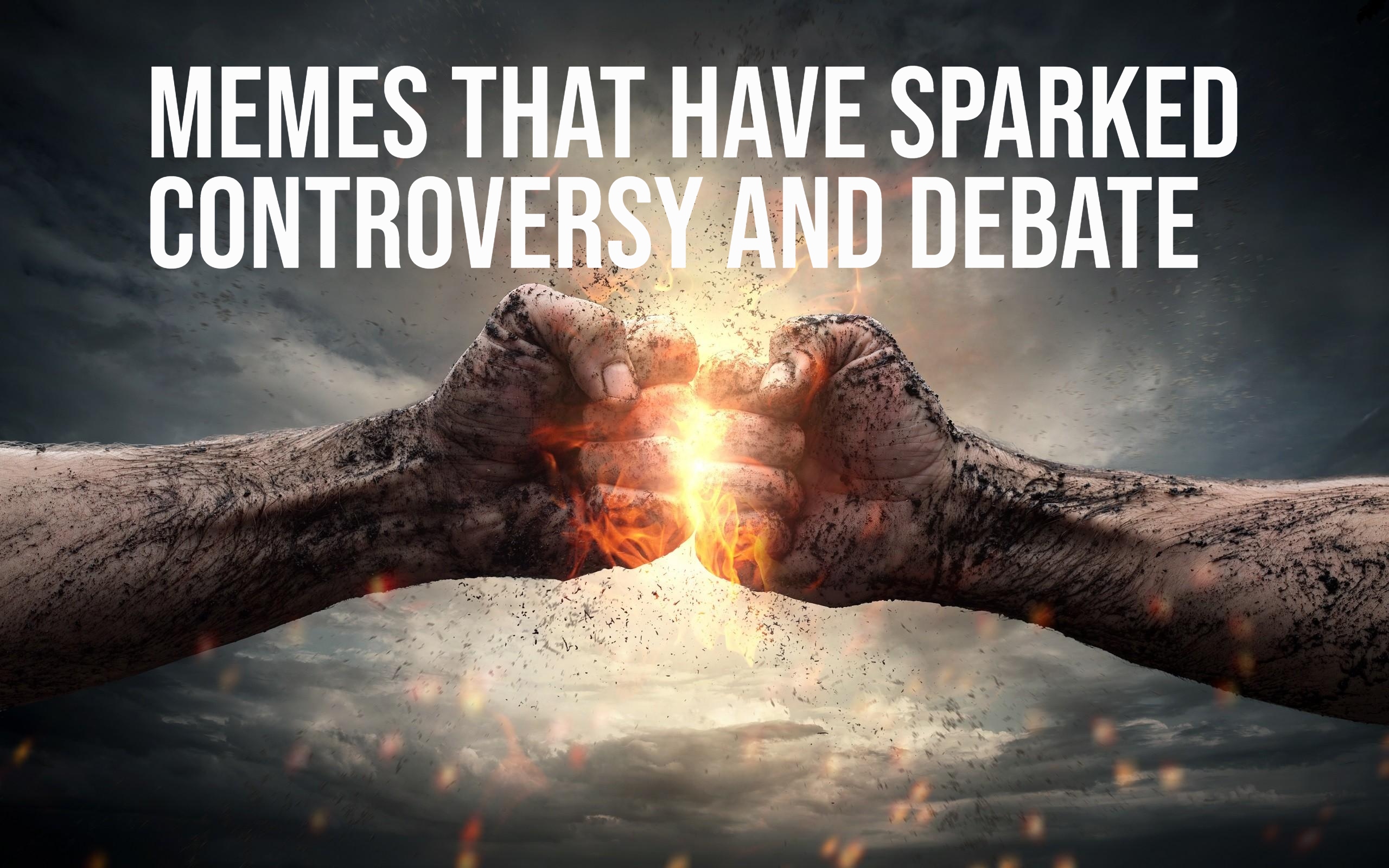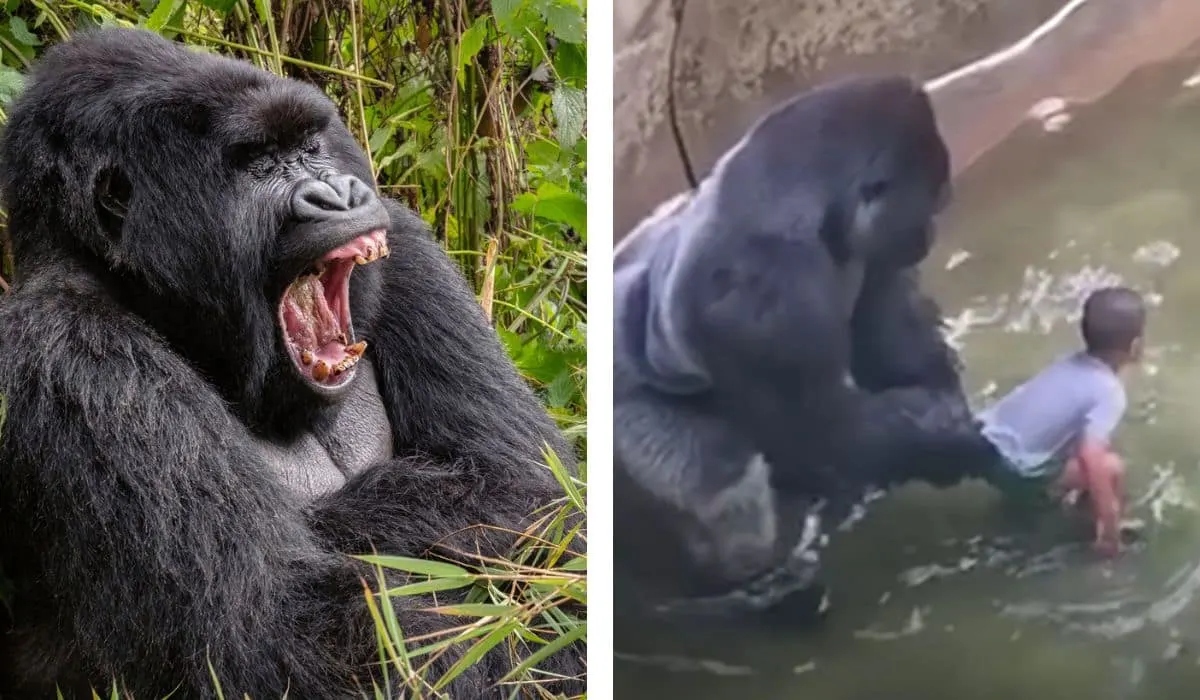Memes That Have Sparked Controversy And Debate - Unveiling The Power Of Internet Culture
Explore a collection of memes that have sparked controversy and debate in the world of internet culture. From shocking incidents to viral hoaxes and misunderstood symbols, discover the intriguing stories behind these online sensations.
Author:Maxwell CanvasReviewer:Caden SteelheartSep 22, 202316.4K Shares335.5K Views

Memes, those seemingly harmless and often humorous images or videos shared across the internet, have become a significant part of modern digital culture. Different memes frequently become popular on social media sites like Twitter and Facebook.
While many memes bring laughter and entertainment, some memes that have sparked controversy and debatefrom politics and social issues to ethics and morality have been part of the internet culture too.
From a shocking incident that challenged ethical boundaries to a disturbing hoax that revealed the dark side of fandoms and the evolution of an innocent character into a symbol of hate, these examples of memes that have sparked controversy and debate illustrate the complex dynamics of internet culture. They also underscore the need for responsible online behavior, critical thinking, and ethical considerations in navigating the digital realm.
For this list, we'll be looking at wildly popular memes that have sparked a lot of argument, are shocking or rude, or have just had bizarre and unexpected results.
The Eating Tide Pods Meme - Dangerous Behavior And The Influence Of Online Trends
The "Eating Tide Pods" meme, which emerged in 2018, is one of the most controversial and concerning examples of internet trends gone awry. It originated from videos and images depicting individuals biting into or consuming laundry detergent pods, often with the intent of garnering attention and likes on social media.
Controversy surrounding the meme primarily centers on the dangerous and potentially life-threatening behavior it promoted. Tide Pods contain toxic chemicals that can cause serious harm if ingested. The meme's popularity led to real-life cases of poisoning and hospitalizations, prompting public health warnings and concerns.
Debates on the "Eating Tide Pods" meme have focused on the influence of online trends on impressionable individuals, especially young people. It raises questions about the responsibility of internet platforms, content creators, and the public in curbing harmful behaviors and ensuring online safety.
Hugh Mungus - A Case Of Misunderstanding And Internet Infamy
The "Hugh Mungus" meme, born from a real-life incident involving a man named Rudy Pantoja Jr., is a prime example of how a simple encounter can become an internet sensation, leading to both controversy and confusion.
In 2016, Rudy Pantoja attended a Seattle City Council meeting, where he jokingly introduced himself as "Hugh Mungus" when asked about his name. A video clip of this interaction was uploaded to YouTube, and it quickly gained attention. However, the meme took a controversial turn when some online users began to misinterpret the situation, falsely accusing Pantoja of sexual harassment.
The controversy surrounding the "Hugh Mungus" meme reveals the dangers of miscommunication and the potential for internet mob mentality. Pantoja's harmless joke turned into a firestorm of accusations, harassment, and even threats against him. The meme highlights the importance of context and responsible sharing of content online, as well as the need for empathy when dealing with real people caught in internet controversies.
The ALS Ice Bucket Challenge - A Viral Phenomenon For A Good Cause
The ALS Ice Bucket Challenge, while not inherently controversial, sparked debate and discussion due to its widespread popularity and impact on social media. The challenge involved individuals dumping a bucket of ice water over their heads to raise awareness and funds for amyotrophic lateral sclerosis (ALS) research.
Critics of the ALS Ice Bucket Challenge questioned the effectiveness of "slacktivism," where people participate in easy online challenges without fully understanding the cause they are supporting. Some argued that the challenge oversimplified a complex disease and did not address the need for sustained, long-term support for ALS research and patient care.
On the other hand, proponents defended the challenge as a successful awareness-raising and fundraising campaign. It brought significant attention and millions of dollars to ALS research, leading to important advancements in understanding and potentially treating the disease.
The ALS Ice Bucket Challenge's controversy highlights the potential impact of viral internet trends on charitable causes and prompts discussions about the effectiveness of online activism. It serves as a case study of how social media can be used to mobilize support for important issues and raises questions about the balance between raising awareness and taking concrete action.
Happy Merchant - An Offensive Meme Promoting Anti-Semitism
The "Happy Merchant" meme is a disturbing and highly controversial image that portrays a caricatured Jewish stereotype, often accompanied by anti-Semitic text or symbols. The meme's intent is to promote hateful and harmful stereotypes about Jewish people.
Controversy surrounding the "Happy Merchant" meme centers on its blatant promotion of hate speech and anti-Semitism. It has been widely condemned by individuals and organizations for perpetuating harmful stereotypes and contributing to online harassment and discrimination against Jewish communities.
The meme's existence highlights the darker side of internet culture, where some individuals use humor and satire as a guise to spread harmful ideologies. Its controversy serves as a reminder of the ongoing battle against hate speech and discrimination in online spaces and the importance of vigilance in identifying and countering such content.
Alex From Target - Unexpected Fame And Invasion Of Privacy
The "Alex from Target" meme is a prime example of how a regular person's life can be upended by the internet's relentless attention. In November 2014, a seemingly ordinary photo of a Target employee named Alex Lee went viral on Twitter. The image portrayed a young man working at a cash register and quickly garnered widespread attention, turning Alex into an overnight internet sensation.
The controversy surrounding the "Alex from Target" meme revolves around the invasion of privacy and the ethics of turning a private individual into a public spectacle. Alex Lee, who had no control over his sudden fame, faced the challenges of dealing with unwanted attention, invasive media coverage, and even harassment. Critics argued that the meme exemplified the darker side of internet culture, where personal boundaries are often disregarded for the sake of viral content.
This meme serves as a cautionary tale about the potential consequences of internet fame and the need for responsible online behavior. It prompts discussions about the ethical considerations of sharing and engaging with content that involves private individuals.
Star Wars Kid - A Lesson In Cyberbullying And Empathy
The "Star WarsKid" meme emerged in the early 2000s when a video of a teenager named Ghyslain Raza went viral. The video depicted Raza playfully imitating a Jedi using a golf ball retriever as a lightsaber. While the intention behind the video was harmless self-amusement, it quickly became the subject of ridicule and mockery on the internet.
Controversy surrounding the "Star Wars Kid" meme highlights the dangers of cyberbullying and the consequences of online harassment. Raza, unaware that the video would be shared online, faced immense humiliation and bullying as it spread across the internet. The incident shed light on the importance of empathy and the responsibility of online communities in protecting individuals from harm.
The meme also prompted discussions about the long-lasting impact of online harassment on an individual's mental and emotional well-being. It serves as a reminder that behind every meme or viral sensation, there is a real person with feelings and vulnerabilities.
Harambe - Tragedy Turned Meme And Ethical Debates
Harambe the gorilla became an internet sensation in 2016 following a tragic incident at the Cincinnati Zoo. Harambe was shot and killed to protect a child who had fallen into his enclosure. The incident sparked debates about zoo safety, parenting, and the ethics of killing an endangered animal.
The "Harambe" meme emerged as a form of both tribute and satire. It featured various humorous or absurd scenarios involving Harambe and often used the phrase "Dicks out for Harambe." However, controversy surrounded the meme, as some believed it was disrespectful to both the gorilla and those affected by his death.
The meme raises questions about the ethics of using real-life tragedies for comedic purposes and the fine line between humor and insensitivity. It also highlights the internet's capacity to turn real-world events into viral phenomena, often blurring the line between remembrance and mockery.
Logan Paul’s Suicide Forest Video - A Shocking Incident And Ethical Debates
In December 2017, popular YouTuber Logan Paul uploaded a video titled "We found a dead body in the Japanese Suicide Forest," sparking one of the most significant controversies in the history of internet culture. The video showed Paul and his friends encountering a deceased individual in Japan's Aokigahara Forest, known for its association with suicides.
The controversy surrounding Logan Paul's video revolves around the ethical considerations of filming and sharing sensitive and potentially traumatic content. Critics argued that Paul's decision to include the deceased individual's body in his vlog showed a lack of empathy and respect for the deceased and their family. It also raised concerns about the ethics of monetizing such content on a platform accessible to a young audience.
The incident prompted discussions about the responsibilities of content creators on social media platforms and the need for stricter guidelines regarding sensitive and potentially harmful content. It also underscored the broader issue of digital ethics and the impact of internet fame on individual behavior.
CuttingForBieber - A Disturbing Hoax And The Dark Side Of Fandom
In 2013, a disturbing and potentially life-threatening trend emerged on social media, known as "CuttingForBieber." It began as a hoax, falsely claiming that pop sensation Justin Bieber had been involved in self-harm. The hoax encouraged fans to engage in self-injury as a form of protest or solidarity with the singer.
The controversy surrounding "CuttingForBieber" highlights the power and influence of fandoms in the digital age, as well as the potential for misinformation to spread rapidly online. Although the trend was later revealed as a hoax, it raised concerns about the internet's capacity to amplify harmful behaviors and the responsibility of celebritiesand influencers in addressing their fan base.
The meme serves as a stark reminder of the consequences of misinformation and the need for critical thinking and media literacy in the digital era. It also highlights the responsibility of celebritiesand influencers in guiding and educating their fan communities.
Pepe The Frog - From Innocent Meme To Hate Symbol And Legal Battles
Pepe the Frog started as an innocent internet meme but evolved into a symbol of hate and controversy due to its misuse by extremist groups. The controversy surrounding Pepe underscores the complexities of reclaiming and protecting a meme's original intent and image.
Cartoon character Pepe the Frog has gained popularity as an internet meme; those who are unfamiliar with the character's name frequently refer to it as the "sad frog meme". The character had his online animation debut in Boy's Club in 2005. The character also made the debut appearance of its catchphrase, "feels good, man."
In response to the unauthorized use of Pepe in offensive contexts, its creator, Matt Furie, initiated legal proceedings to protect his character from further misuse. This legal battle symbolizes the struggle to maintain control over internet content and the challenges of combating hate speech in online spaces.
The Pepe controversy also highlights the broader issue of meme appropriation and the internet's capacity to transform innocuous symbols into potent symbols of hate. It raises questions about the responsibility of internet communities, social media platforms, and content creators in curbing the spread of harmful content and hate speech.
Frequently Asked Questions
How Did The "Pepe The Frog" Meme Become Controversial?
"Pepe the Frog" was co-opted by far-right groups, leading to accusations of hate speech and racism, resulting in symbol appropriation.
What Are Some Funny Controversial Memes?
- "Two Buttons Meme"
- "Is This a Pigeon?"
- "Change My Mind"
- "Distracted Boyfriend Meme"
- "Mocking SpongeBob"
- "Expanding Brain Meme"
- "Woman Yelling at a Cat"
- "Drake Hotline Bling"
- "This Is Fine"
How Did The "Tide Pod Challenge" Meme Lead To Controversy?
The "Tide Pod Challenge" meme raised concerns over dangerous behavior and the role of viral internet challenges.
Conclusion
Memes that have sparked controversy and debate are a fascinating aspect of modern internet culture. These digital creations, often born out of humor and satire, possess the power to challenge societal norms, provoke discussions on critical issues, and reflect the complexities of our interconnected world.
While some may dismiss them as mere internet ephemera, these memes have left an indelible mark on online discourse, highlighting the enduring influence of humor and satire in shaping the conversations of our times.
Whether they serve as a mirror to society's values or as a catalyst for social change, one thing is clear: controversial memes have firmly established themselves as a significant force in the ever-evolving landscape of digital communication.
Jump to
The Eating Tide Pods Meme - Dangerous Behavior And The Influence Of Online Trends
Hugh Mungus - A Case Of Misunderstanding And Internet Infamy
The ALS Ice Bucket Challenge - A Viral Phenomenon For A Good Cause
Happy Merchant - An Offensive Meme Promoting Anti-Semitism
Alex From Target - Unexpected Fame And Invasion Of Privacy
Star Wars Kid - A Lesson In Cyberbullying And Empathy
Harambe - Tragedy Turned Meme And Ethical Debates
Logan Paul’s Suicide Forest Video - A Shocking Incident And Ethical Debates
CuttingForBieber - A Disturbing Hoax And The Dark Side Of Fandom
Pepe The Frog - From Innocent Meme To Hate Symbol And Legal Battles
Frequently Asked Questions
Conclusion

Maxwell Canvas
Author
Maxwell Canvas, a charismatic and fearless crypto evangelist, defies conventions and blazes a trail in the realm of digital currencies. With his unique physique serving as a symbol of resilience, he challenges societal norms and proves that true expertise transcends appearances. Against a backdrop of a blurred and ever-shifting market, Maxwell's work becomes a masterpiece, painting a vivid picture of knowledge and inspiration.
With unwavering passion, Maxwell empowers others to embrace the transformative potential of blockchain technology. His captivating presence and unyielding dedication captivate audiences, turning skepticism into curiosity and igniting a spark of interest in the world of cryptocurrencies. Maxwell Canvas stands as a visionary force, leaving an indelible mark on the crypto landscape, inspiring others to explore decentralized possibilities and embrace a future of innovation and financial empowerment.

Caden Steelheart
Reviewer
Caden Steelheart, an enigmatic author, weaves tales that immerse readers in the depths of sin city's underbelly. With his words as a weapon, he crafts literary masterpieces that reflect the dark and dangerous spirit of the city. Caden's writing captures the gritty essence of sin city, delving into the intricacies of its characters and the moral complexities that define their existence.
Born amidst the shadows, Caden draws inspiration from the relentless chaos and unforgiving nature of the city. His words carry the weight of experience, creating a vivid and haunting portrayal of sin city's undercurrents. Through his stories, he explores the blurred lines between right and wrong, exploring themes of power, deception, and redemption.
Caden Steelheart's literary prowess has made him a name whispered in literary circles, captivating readers with his ability to immerse them in sin city's intricately woven tapestry. With each written word, he invites readers to journey into the darker realms of the human experience, offering them a glimpse into the secrets and sins that shape the city's inhabitants. Caden Steelheart, a master of capturing the essence of sin city through his writing, continues to captivate audiences with his haunting and evocative narratives.
Latest Articles
Popular Articles









